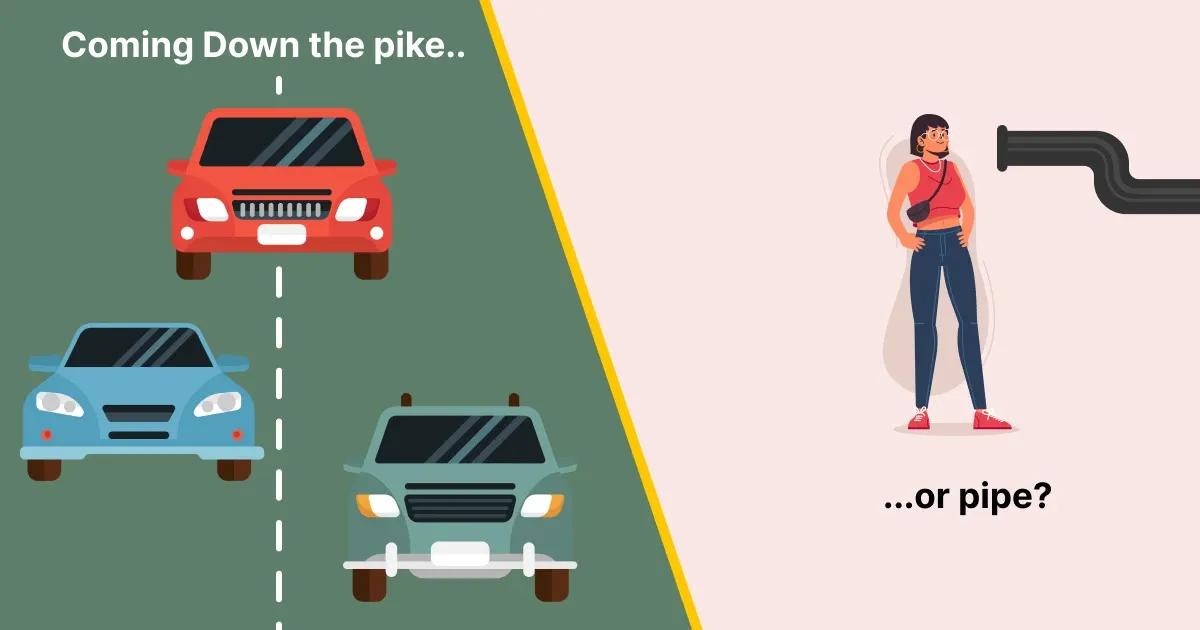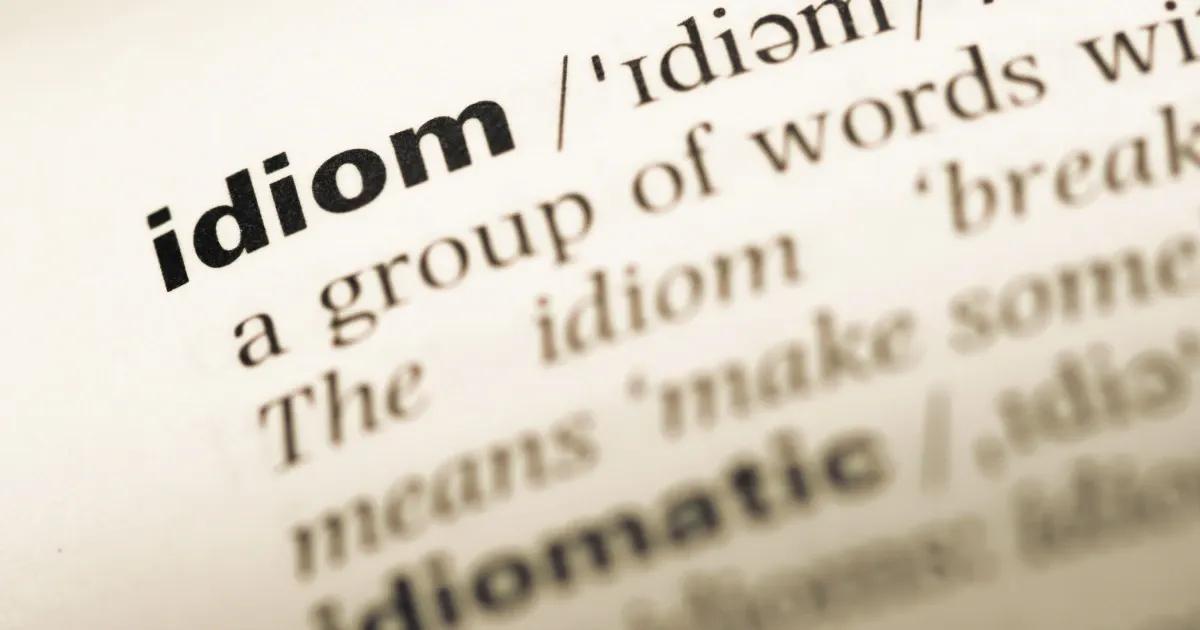Language is a beautiful tapestry woven together with idiomatic expressions that add flair and depth to our conversations and writings. However, amidst the vibrant linguistic landscape, there are occasional mix-ups that lead to confusion. One such case involves the idioms "Coming Down the Pike" or "Coming Down the Pipe."
In this blog post, we will delve into the origins, meanings, and contexts of these idioms, aiming to clear the mist surrounding them.
We will also explore the role of idiomatic expressions in language and the importance of preserving their true essence for effective communication.
ᴀᴅᴠᴇʀᴛɪsᴇᴍᴇɴᴛ
Moreover, we will discover how grammar checkers, particularly the powerful tool Copychecker, can aid in refining our language skills and avoiding common grammar mistakes.
 You can also read: What does TS mean in text and how to use it.
You can also read: What does TS mean in text and how to use it.
"Coming Down the Pike": The Original Expression

Origin and historical usage of "coming down the pike"
Let us begin our journey by tracing the roots of the original idiom, "Coming Down the Pike." This expression has its origins in American English, dating back to the early 20th century when the word "pike" was used to refer to turnpikes or toll roads.
The phrase symbolizes the arrival of something that was once distant and is now approaching swiftly, like a traveller or a vehicle descending from a long stretch of a turnpike road.
Meaning and context of the idiom
The idiom is commonly used to suggest that an event, opportunity, or change is on the horizon and will soon have a significant impact. It conveys a sense of anticipation and excitement for what lies ahead, and the notion that an impending development will be consequential.
Examples of correct usage in sentences
- "The latest technological breakthrough is coming down the pike, and it promises to revolutionize the way we live."
- "I can see major changes coming down the pike for our company's future."
ᴀᴅᴠᴇʀᴛɪsᴇᴍᴇɴᴛ
"Coming Down the Pipe": The Emergence of a Confusion

Tracing the roots of the mistaken phrase
As language evolves, expressions can undergo changes, leading to new variations and sometimes confusion. The emergence of "Coming Down the Pipe" as a mistaken version of the original idiom can be attributed to colloquial usage and misinterpretations over time.
Analysing how the mix-up occurred
The term "pipe" implies a conduit or channel, suggesting a flow of information or resources through a narrow pathway. This association might have led to the inadvertent blend of the two idioms, with "coming down the pipe" being used as a misinterpretation of "coming down the pike."
Instances of misuses and their impact on language
With the rise of digital communication and social media platforms, language spreads faster than ever before. As a result, erroneous expressions can proliferate rapidly, perpetuating the confusion and potentially diluting the rich heritage of idiomatic expressions.
Common Grammar Mistakes and the Role of Copychecker Tools

Introducing Copychecker: A powerful grammar checker tool
In the pursuit of precision and clarity in our writing, grammar checkers play an invaluable role. Among the plethora of available tools, Copychecker stands out as a robust and reliable option, aiding writers in honing their language skills and polishing their work.
Understanding typical grammar errors in expressions
Grammar errors can occur due to various reasons, including homophones, misplaced modifiers, subject-verb agreement issues, and more. We will explore specific instances where these errors might affect the use of idiomatic expressions.
How Copychecker helps identify and correct such errors
Copychecker, with its advanced algorithms and natural language processing capabilities, can detect a wide range of grammar mistakes. From minor punctuation errors to complex sentence structures, the tool provides valuable insights to enhance the overall quality of the writing.
ᴀᴅᴠᴇʀᴛɪsᴇᴍᴇɴᴛ
The Importance of Idiomatic Expressions

Emphasizing the value of idioms in language
Idioms enrich language by adding cultural flavour, vivid imagery, and depth of meaning. They allow us to express complex ideas in a concise and impactful manner, fostering a sense of connection and understanding among speakers.
Cultural relevance and connections to idiomatic phrases
Idioms often hold cultural significance, reflecting historical events, traditions, and shared experiences. They create a sense of belonging and identity within a community, transcending mere words to become expressions of collective wisdom.
Why preserving idioms is essential for effective communication
Preserving idioms is crucial to maintaining linguistic heritage and promoting cultural diversity. Additionally, idiomatic expressions contribute to effective communication, as they resonate with emotions and experiences, making conversations more engaging and relatable.
Enhancing Writing with Grammar Checkers

How grammar checkers improve writing accuracy
Grammar checkers, like Copychecker, serve as valuable writing companions by identifying and rectifying grammatical errors, ensuring that the intended message is conveyed clearly and effectively. They act as a safety net, catching mistakes that might otherwise go unnoticed.
Beyond simple mistakes: Advanced grammar checking features
Modern grammar checkers have evolved to offer more than just basic grammar corrections. They can assist with style and tone adjustments, help improve sentence structure, and provide suggestions for better word choices, enhancing the overall quality of the writing.
ᴀᴅᴠᴇʀᴛɪsᴇᴍᴇɴᴛ
Utilizing grammar tools for idiomatic expressions
When it comes to idioms, grammar checkers can be particularly useful in ensuring that the expressions are used correctly in the appropriate contexts. By providing context-specific feedback, these tools enable writers to grasp the true essence of idioms and employ them effectively.
Mastering "Coming Down the Pike" or "Coming Down the Pipe"

Tips for distinguishing between the two phrases
To differentiate between "Coming Down the Pike" and the confused version "Coming Down the Pipe," it is essential to understand the origin and intended meaning of each expression. Careful attention to the context in which these idioms are used can help in their proper application.
Understanding proper contexts for each idiom
Both idioms convey the notion of approaching events or developments. However, "Coming Down the Pike" specifically indicates something with significant impact, while "Coming Down the Pipe" might suggest a flow of information or resources.
Practicing correct usage in your writing
Practice makes perfect, and the same applies to language. By incorporating idiomatic expressions into their writing and seeking feedback from grammar checkers, writers can sharpen their language skills and confidently wield idioms to communicate with clarity and flair.
Embracing Language Evolution

The dynamic nature of language and idioms
Language is an ever-changing entity, adapting and evolving to reflect the shifting needs and preferences of its users. Idioms, as an integral part of language, are not immune to this process, and some variations may emerge over time.
Embracing changes while respecting tradition
As language evolves, it is essential to embrace the changes while retaining a sense of appreciation for the traditional expressions that have stood the test of time. Balancing innovation with tradition allows language to flourish while preserving its cultural heritage.
Language usage in the digital era: Challenges and opportunities
In the digital age, language encounters new challenges and opportunities. The widespread use of social media and online communication platforms can influence language trends and accelerate the spread of expressions, both accurate and mistaken.
FAQs
What does go down the pike mean?
"Going down the pike" is an idiomatic expression that signifies the occurrence of something imminent or approaching. It suggests that a significant event or change is on its way and will soon have an impact.
What is the expression coming down the pipe?
The expression "coming down the pipe" is a mistaken version of the original idiom "coming down the pike." It emerged through misinterpretations and colloquial usage, where "pipe" was substituted for "pike," leading to confusion between the two phrases.
What is another way to say coming down the pike?
An alternative expression with a similar meaning to "coming down the pike" is "coming down the road." Both phrases convey the idea of an impending event or development that will have a notable effect.
Where did coming down the pike originate?
"Coming down the pike" originated in American English during the early 20th century when the word "pike" referred to turnpikes or toll roads. The expression symbolizes something that was distant but is now swiftly approaching, akin to a traveller descending from a long stretch of a turnpike road.
ᴀᴅᴠᴇʀᴛɪsᴇᴍᴇɴᴛ
Conclusion
In conclusion, the idiomatic expressions "Coming Down the Pike" and "Coming Down the Pipe" hold distinct meanings and contexts. Understanding the origins and intended usage of these phrases is vital to avoid confusion and uphold the richness of language.
Idioms, as valuable cultural assets, deserve preservation to maintain the tapestry of language. Embracing the dynamic nature of language and idioms allows us to appreciate its evolution while staying rooted in tradition.
To enhance our writing skills and ensure precision in language usage, grammar checkers like Copychecker prove to be indispensable tools. These tools empower writers to correct common grammar mistakes and confidently employ idiomatic expressions, contributing to effective and engaging communication.






